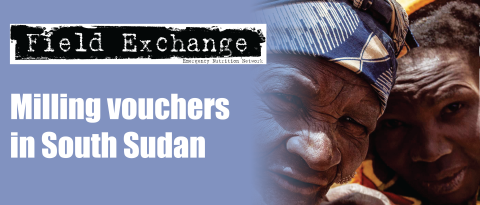Post script: Building resilience: nutrition and beyond

By Gabrielle Appleford and Wendy Erasmus
Gabrielle Appleford is a freelance consultant working with Concern Worldwide Kenya on knowledge management.
Wendy Erasmus is Concern’s Country Director in Kenya.
For Concern, building resilience requires systems thinking and adaptive capacity1. Experience from implementing the CMAM surge model, described in the previous article, reinforces the importance of both. Making health systems ‘disaster proof’ should be an aim of all system strengthening initiatives and is a true reflection of an able system. This principle applies to non-health systems as well. Concern is currently working on adapting and testing the surge model concept for animal health, social protection, and water resource management systems.
Taking the case of animal health as an example, the same surge model components (outlined in Figure 1 of the field article) apply to animal health. An analysis of risk would need to be undertaken to assess the factors that contribute to deterioration of animal health, being sure that there is a clear link between the animal health deterioration and its impact on human health and markets. Once risk factors are identified, thresholds would be set, which, when exceeded, would trigger an appropriate level of response and a standardised, pre agreed package of support. A system of monitoring the situation against the agreed thresholds would need to be developed. In Kenya, this system could be established through the community based disease surveillance approach. Work would need to be done with the County Veterinary Department to design and cost a package of support for each level aimed at averting impact on human health. And lastly, agreement on the scale down of support would need to be negotiated and factored into the model. The same model components and process of model development would be applied to social protection and water resource management, always ensuring adherence to the main four principles of the model: systems strengthening, predictability, demand and context driven, and accessibility.
Working differently requires external agencies, such as Concern, to respect the centrality of government stewards and systems; their role as duty bearer is non-transferrable, even in times of crisis. Ways of working that reinforce this mandate need to be strictly practiced. Supporting the process of recognising and claiming rights, as well as holding duty bearers to account, is a role that external agencies can facilitate and should be considered part of a risk management approach. Respecting systems and processes and the centrality of their stewards and operators, also means that performance metrics need to move beyond therapeutic results so that technical quick wins do not undermine, but rather strengthen, systems in the long run. In the case of Kenya, this means that health and nutrition organisations should be measured on how high impact nutrition interventions (HINI) are achieved and not just on targets reached.
In order for external agencies, such as Concern, to remain relevant – resilient if you will – their technical and operational arsenal needs to expand to incorporate more measures that facilitate adaptive capacity and systems strengthening. The CMAM surge model is an example of such an approach. Being part of the changing conversation, facilitated through vehicles such as the Food Security and Nutrition Working Group (FSNWG)2, allows agencies the opportunity to debate, collaborate and innovate so that their interventions remain relevant to the communities and governments with whom they work. A changing context and the changing nature of risk dictate this. It is hoped that this will mean that more agencies are doing the right thing, at the right time, and reaching the right people through the right systems so that the cycle of late response to humanitarian disaster is reversed in the Horn of Africa.
For more information, contact: Wendy Erasmus, email: wendy.erasmus@concern.net
1Concern Worldwide, (September 2013). Confronting Crisis: Transforming lives through
improved resilience. Concern Worldwide’s learning from the Sahel and Horn of Africa.
2The FSNWG is a regional platform, currently co-chaired by the Intergovernmental
Authority on Development and the Food and Agricultural Organisation. Current
membership includes approximately 80 organisations (governmental, non-governmental
and multi-lateral) which contribute to the working group and its sub-groups
addressing issues of nutrition, markets, food security, livestock and pastoralists.


